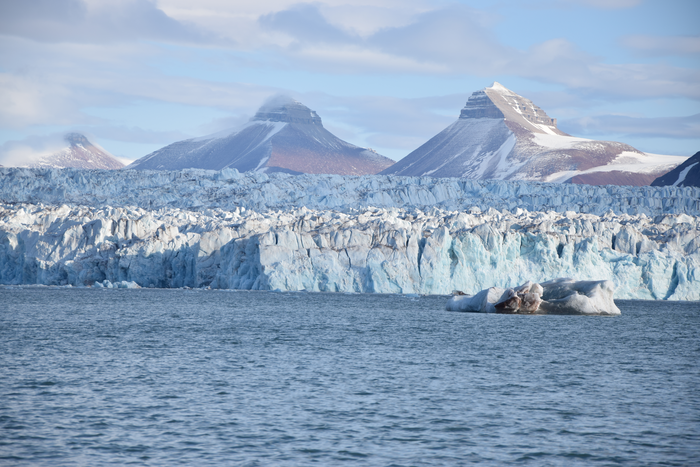Arctic Ocean started warming decades earlier than thought - and could worsen due to climate change
Arctic Ocean began warming rapidly at the beginning of last century by a process called Atlantification

The Arctic Ocean has been getting warmer by mixing with the Atlantic Ocean since the beginning of the 20th century, decades earlier than previously thought, suggests a new study that points to a possible flaw in the models currently used to project future climate change.
The Arctic Ocean began warming rapidly at the beginning of the last century by a process called Atlantification as warmer and saltier waters flowed in from the Atlantic, the researchers said.
While the process of turning the Arctic Ocean into a state resembling the Atlantic is one of the main drivers of warming in the region, instrumental records capable of monitoring this change, such as satellites, only go back about 40 years, they explained.
In the new study, published in the journal Science Advances on Wednesday, an international group of scientists reconstructed the recent history of ocean warming at the gateway to the Arctic Ocean in a region called the Fram Strait, between Greenland and Svalbard.
They reconstructed the change in water column properties, such as temperature and salinity over the past 800 years — looking for signature signs of Atlantification — by analysing the geochemical and ecological data from ocean sediments and marine microorganisms.
“When we looked at the whole 800-year timescale, our temperature and salinity records look pretty constant,” Tesi Tommaso, a co-lead author of the study from the Institute of Polar Sciences of the National Research Council in Bologna, Italy, said in a statement.
“But all of a sudden at the start of the 20th century, you get this marked change in temperature and salinity — it really sticks out,” Dr Tommaso said.
As the world’s oceans are warming due to climate change, they say the Arctic Ocean — the smallest and shallowest of all — is warming at the fastest rate.
Recent studies have pointed out that the Arctic is warming three times more quickly than the planet as a whole with temperatures rising in the region by as much as 3 degree Celsius above pre-industrial levels. This is causing ice in the polar region to melt, which in turn raises global sea levels and submerges low-lying parts of the world.
The process creates a feedback loop, where more melting of ice at the pole exposes more of the ocean’s surface to the sun, releasing heat, raising air temperatures, causing more melting, and so on.
Recent scientific expeditions have also found that these changes can radically alter the marine ecology of the Arctic Ocean, enabling more fish and microbes in the Atlantic to colonise and adapt to the northern seas.
And as the Arctic continues to warm, it would also melt the semi-decomposed permafrost landscape in the northern hemisphere, including parts of Siberia, which stores huge amounts of methane.
The release of this flammable greenhouse gas, which has 80 times more warming power than carbon dioxide, leads to abnormal temperature rises in the region, also sparking wildfires.
“The rate of warming in the Arctic is more than double the global average, due to feedback mechanisms,” study co-author Francesco Muschitiello from the University of Cambridge’s Department of Geography said.
“Based on satellite measurements, we know that the Arctic Ocean has been steadily warming, in particular over the past 20 years, but we wanted to place the recent warming into a longer context,” Dr Muschitiello said.
The scientists said that the connection between the two oceans is capable of shaping Arctic climate variability and could have “important implications” for sea-ice retreat and global sea-level rise as the polar ice sheets continued to melt.
Based on the analysis, the scientists said this warming of the Arctic has a strong correlation with the slowdown of a natural circulation process in the Labrador Sea — where the cold air temperatures and the salinity at the surface make the water denser and cause it to sink to the bottom.
“In a future warming scenario, the deep circulation in this sub-polar region is expected to further decrease because of the thawing of the Greenland ice sheet. Our results imply that we might expect further Arctic Atlantification in the future because of climate change,” Dr Muschitiello cautioned.
The scientists also called for improved climate models that incorporate these findings to better predict future impacts of climate change.
“Climate simulations generally do not reproduce this kind of warming in the Arctic Ocean, meaning there’s an incomplete understanding of the mechanisms driving Atlantification,” Dr Tommaso explained.
“We rely on these simulations to project future climate change, but the lack of any signs of an early warming in the Arctic Ocean is a missing piece of the puzzle,” he added.
Join our commenting forum
Join thought-provoking conversations, follow other Independent readers and see their replies
Comments
Bookmark popover
Removed from bookmarks